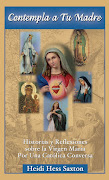
On this the anniversary of the homegoing of our beloved John Paul the Great, I'd like to share a quote from his Mulieris Dignitatem, which touches upon the gift of femininity, a gift that does not depend on biological motherhood:
When we say that the woman is the one who receives love in order to love in return, this refers not only or above all to the specific spousal relationship of marriage. It means something more universal, based on the very fact of her being a woman within all the interpersonal relationships which, in the most varied ways, shape society and structure the interaction between all persons - men and women. In this broad and diversified context, a woman represents a particular value by the fact that she is a human person, and, at the same time, this particular person, by the fact of her femininity. This concerns each and every woman, independently of the cultural context in which she lives, and independently of her spiritual, psychological and physical characteristics, as for example, age, education, health, work, and whether she is married or single.
The passage from the Letter to the Ephesians which we have been considering enables us to think of a special kind of "prophetism" that belongs to women in their femininity. The analogy of the Bridegroom and the Bride speaks of the love with which every human being - man and woman - is loved by God in Christ. But in the context of the biblical analogy and the text's interior logic, it is precisely the woman - the bride - who manifests this truth to everyone. This "prophetic" character of women in their femininity finds its highest expression in the Virgin Mother of God. She emphasizes, in the fullest and most direct way, the intimate linking of the order of love - which enters the world of human persons through a Woman - with the Holy Spirit. At the Annunciation Mary hears the words: "The Holy Spirit will come upon you" (Lk 1:35). (29)
These are comforting words to those of us who -- because we are unmarried, consecrated religious, or married but unable to conceive or carry children to term -- are not biological mothers. By virtue of our femininity, we embody an "order of love" that was first lived out in the life of the Blessed Mother.
My sisters in Christ, how are you being called to be a "presence of love" in the world today?












 My StumbleUpon Page
My StumbleUpon Page